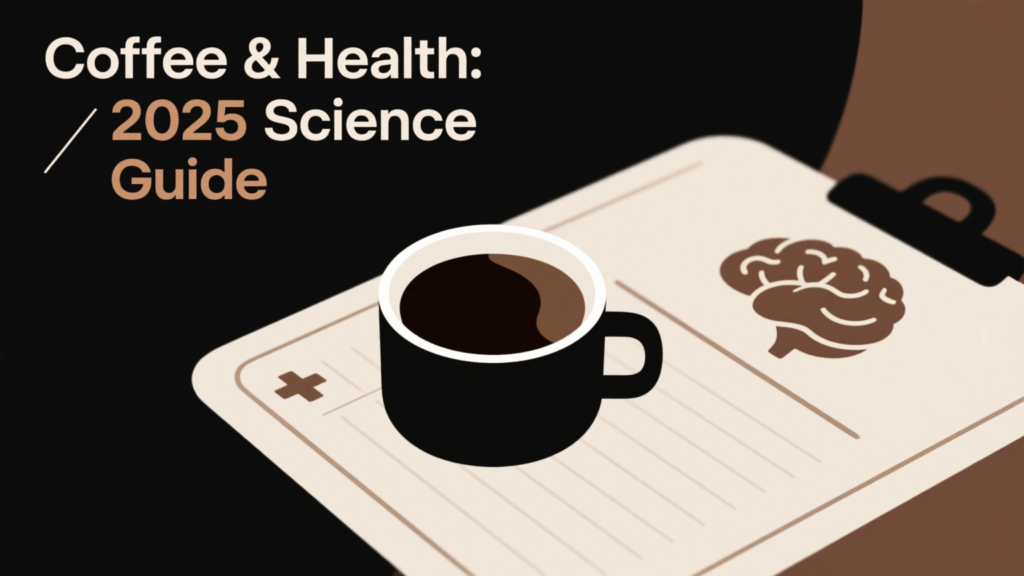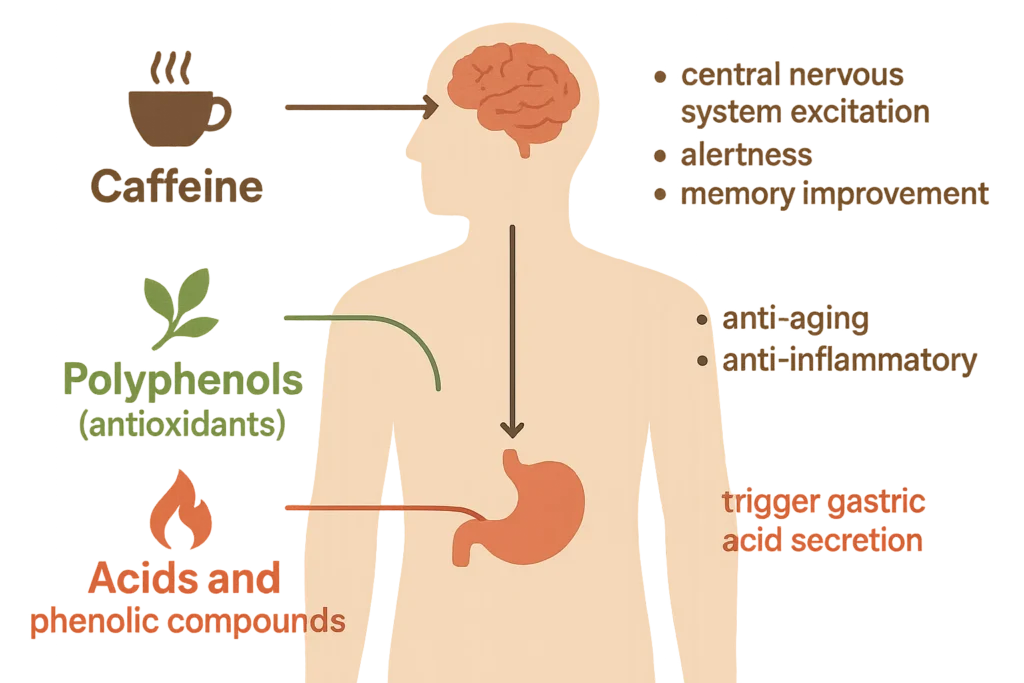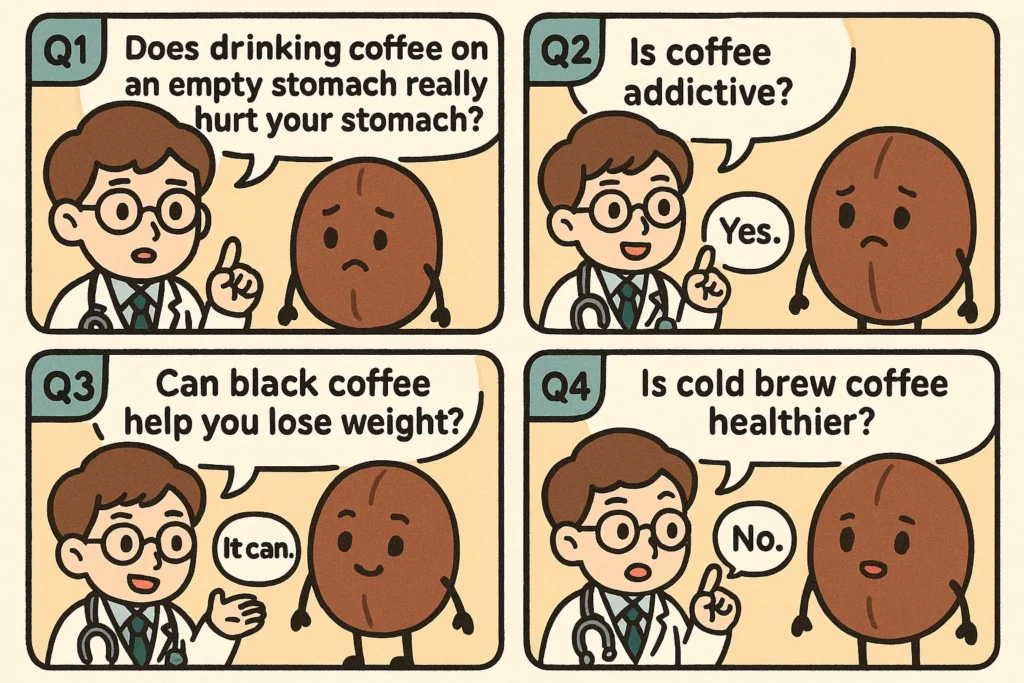Coffee has become the daily must-have of millions of people the world over. It is no longer just a drink, but a lifestyle – be it for the sake of greater concentration, a better mood, or only for the comforting effect that it has on someone. However, its health side is still ambiguous. While some people laud it as an all-curing potion, others express concern about the addiction and health threats that it accompanies. Therefore, the question we are going to discuss here is whether coffee is good or bad for you? In this article, we look through the most recent scientific research of 2025 and equip you with a sound coffee decision-making capacity.

The Key Ingredients in Coffee and Their Effects
Whether coffee is healthy or unhealthy for us mainly depends on the presence or absence of certain compounds. Here is the information about them and their effects that make coffee a drink which, at the same time, is both beneficial and disputable:
1. Caffeine
Caffeine has been identified as the key psychoactive ingredient in coffee. It is the one that pumps the central nervous system, thus making us alert and at the same time enhancing our memory and quick thinking. With this in mind, it is very important to remember that an excess of caffeine may cause restlessness, stom- ach ache, difficulty sleeping at night, and after that insomnia, especially if the product is taken later in the day.
2. Antioxidants (Polyphenols)
Coffee is also considered a potent source of polyphenols, one of the most crucial one being chlorogenic acid. These plant-based compounds are powerful warriors in the fight against oxidative stress, reducing inflammation, and preventing or lowering the risk of certain cancers and the process of aging as well.
3. Acids and Phenolic Compounds
These are the substances responsible for coffee’s taste and corrosiveness. However, in some individuals with overly sensitive digestive systems, it may be harmful rather than neutral.
Science-Backed Health Benefits
A growing body of research suggests that moderate coffee consumption offers several health benefits.
1. Lower Risk of Type 2 Diabetes
Per a study that lasted for many years and was done by the Harvard School of Public Health, those drinking 3–4 cups of coffee per day have 25% less risk of becoming diabetic in comparison with other people. Such beneficial effects can be put down to the antioxidants and caffeine that contribute toward improved insulin resistance.
2. Enhanced Cognitive Function
A moderate caffeine intake contributes to better concentration, attention, and memory. Moreover, evidence shows a lowered possibility of Alzheimer’s and Parkinson’s diseases for regular coffee consumers.
3. Boosted Metabolism and Fat Burning
Caffeine can be a good help for people because of its natural fat-burning, and metabolism boosting qualities, which are the reasons for black coffee’s popularity among those who like to work out hard.
4. Liver and Cardiovascular Protection
There are studies suggesting coffee as a protector against liver diseases, like cirrhosis, fatty liver, and liver cancer. Furthermore, moderate consumption (2–3 cups/day) may also be good for your heart.

Potential Risks and Precautions
Although coffee has its advantages, excessive intake or the existence of specific health conditions may cause some hazards.
1. Caffeine Overload
Taking in a quantity of caffeine that surpasses 400mg per day (about 3–4 cups) can make a person feel nervous, have a faster heart rate, lose sleep, and feel anxious — specifically if he/she is susceptible.
2. Digestive Sensitivity
Drinking coffee on an empty stomach or choosing high-acidity blends can upset the stomach’s tissues, bring about acid reflux, or create gas. It’s best to eat and drink at the same time.
3. Pregnancy and Hypertension
Pregnant women should ideally have coffee giving them caffeine content no more than 200 mg a day if they are thinking of preventing preterm baby delivery and a newborn with a low weight. Those who have hypertension should be cautious in their decision to drink coffee as well.
4. Added Sugars and Creamers
What was earlier a healthy drink may turn into a sugar bomb because things like lattes having a taste, whipped toppings, syrups, and creamers were added. The additions are likely to be the source of weight gain and blood sugar spikes.
Common Coffee Myths: Q&A
Q1: Is it true that coffee on an empty stomach harms the gut?
The answer is for the most part ‘Yes’. Mostly, it is not wise for the people who are sensitive to it to drink coffee alone on an empty stomach as that would lead to glands secreting a lot of gastric acid.
Q2: Is coffee addictive?
Many people would agree that caffeine can be addictive to an extent, even though it is a mild addiction. However, no need to worry about it as the withdrawal effects do go away after a maximum of five days.
Q3: Can black coffee help with weight loss?
It is a proven fact that black coffee, when drank in a small quantity and without sugar, can aid in the release of fat. Nevertheless, black coffee cannot be your only solution and hence must be consumed with a nutritious diet.
Q4: Is cold brew healthier than hot coffee?
It is generally true that cold brew has a lower pH and can affect the stomach less, it is also true that the nutrient differences between cold brew and hot coffee are so insignificant that it all comes down to what you like and can stand.

Smart Coffee Habits: How to Drink Wisely
- Do not surpass the daily intake of 3-4 cups (which is equal to no more than 400 mg caffeine).
- The most appropriate moment for consuming coffee is from 10 AM to 2 PM.
- Under no circumstances should you drink coffee on an empty stomach.
- Opt for black coffee or low-calorie variations.
- If you lack the tolerance for caffeine, you can experience the same flavor with decaffeinated or low-caffeine types of coffee.
Conclusion: Coffee Isn’t Really Good or Bad — It’s All about Finding a Healthy Equilibrium
In reality, coffee is either good or awful depending on the method and frequency of consumption. A reasonable daily dose of coffee among the general population is something that can positively affect the health, for example, it is preventive of problems with the liver and has a beneficial impact on the metabolism. However, the following key factors all have a role to play: individual disposition, basic health issues, and any additives that may be included in it.
Then, the question of whether coffee is good or bad for you is misleading, as it is different for each individual case. The consensus among scientific experts is: It’s all about the method in which it is consumed.